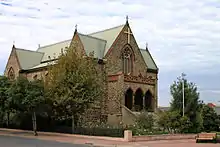Uniting Church in Australia
The Uniting Church in Australia (UCA) was founded on 22 June 1977,[2] when most congregations of the Methodist Church of Australasia, about two-thirds of the Presbyterian Church of Australia and almost all the churches of the Congregational Union of Australia united under the Basis of Union.[3] According to the church, it had 243,000 members in 2018.[1] In the 2016 census, about 870,200 Australians identified with the church;[4][5] in the 2011 census, the figure was 1,065,796. The UCA is Australia's third-largest Christian denomination, behind the Catholic and the Anglican Churches.[6] There are around 2,000 UCA congregations,[1] and 2001 National Church Life Survey (NCLS) research indicated that average weekly attendance was about 10 per cent of census figures.[7]
| Uniting Church in Australia | |
|---|---|
 UCA logo | |
| Classification | Protestantism |
| Orientation | Calvinism and Methodism |
| Polity | Presbyterianism, Connexionalism and Congregationalism |
| President of the Assembly | Sharon Hollis |
| Distinct fellowships | Uniting Aboriginal and Islander Christian Congress |
| Associations | NCCA, WCC, CCA, WCRC, World Methodist Council, Pacific Conference of Churches |
| Region | Australia |
| Origin | 1977 |
| Merger of | Methodist Church of Australasia, Presbyterian Church of Australia, Congregational Union of Australia |
| Congregations | 2,000[1] |
| Members | 243,000 (2016)[1] |
| Nursing homes | UnitingCare |
| Aid organization | UnitingCare UnitingWorld |
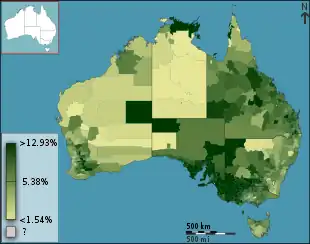
The UCA is one of Australia's largest non-government providers of community and health services. Its service network consists of over 400 agencies, institutions, and parish missions, with its areas of service including aged care, hospitals, children, youth and family, disability, employment, emergency relief, drug and alcohol abuse, youth homelessness and suicide.[1] Affiliated agencies include UCA's community and health-service provider network, affiliated schools, the Uniting Aboriginal and Islander Christian Congress, Frontier Services and UnitingWorld.
Organisation
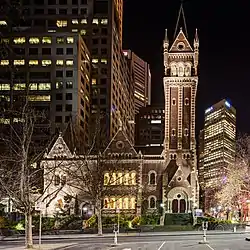
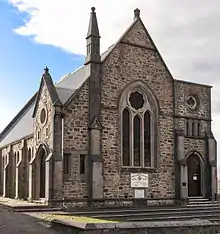
The UCA is a national, unincorporated association of councils, each of which has responsibility for functions in the church. The councils are congregations (local), presbyteries (regional), synods (state) and an assembly (national).[8]
The membership of each council is established by the constitution. Each council includes Women and Men, lay and ordained. The offices of president of assembly, moderator of synod (who chair these councils) and other offices are open to all UCA members.
The UCA is a non-episcopal church, with no bishops. Leadership and pastoral roles are nominally performed by presbyteries, but in reality by individuals.
Assembly
The UCA assembly meets every three years, and is chaired by the president.[1] The 14th Assembly met in Perth from 12 to 18 July 2015. The 15th Assembly, hosted by the Synod of Victoria and Tasmania in Box Hill, met in July 2018. Assembly business between meetings is conducted by the Assembly Standing Committee, which meets three times per year (usually in March, July and November). Membership is drawn from throughout Australia, with 18 members elected at each assembly.
President
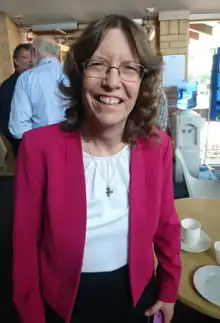
The current president is Reverend Sharon Hollis since she was installed as president in the online meeting of the 16th Assembly on 17 July 2021. She replaced Deidre Palmer, who had succeeded Stuart McMillan at the start of the 15th Assembly on 8 July 2018.[9] Palmer was the second woman in the role, following Jill Tabart (1994-1997).[10] Palmer was the moderator of the Presbytery and Synod of South Australia from November 2013 to November 2016.[11] Hollis was moderator of the Synod of Victoria and Tasmania at the time of her election in 2018 as the president-elect and became president at the beginning of the sixteenth assembly, which was to be held in Queensland in 2021.[12] As a result of the COVID-19 pandemic, the meeting was moved to a shorter, online form.[13]
Synods
Synods are UCA councils which roughly correspond to state boundaries. Each synod meets about once per year, with a standing committee to represent it between sessions. Synod responsibilities include the promotion and encouragement of the church's mission, theological and ministerial education, and overseeing property matters.[14] There are six synods:[15]
- Synod of New South Wales and the ACT (formerly the NSW Synod)[16]
- Synod of Queensland[17]
- Synod of South Australia[18]
- Synod of Western Australia[19]
- Synod of Victoria and Tasmania[20]
- The Northern Synod, which includes the Northern Territory, north-west Western Australia and northern South Australia.[21]
Presbyteries
Each synod generally consists of a number of presbyteries. Western Australia has a unitary presbytery-synod model. South Australia also had a single presbytery and synod for 15 years, until 2019. These large presbyteries enable groups of congregations to work together, based on geographic location or similar interests or characteristics. Selection of ministerial candidates and the placement of ministers are decided at the presbytery level.
Congregations
There are about 2,000 UCA congregations, with 243,000 members and adherents. Congregations range in size from a dozen to hundreds of members.[1] They are the local church, the setting for regular worship (generally on Sundays). Many churches also conduct worship services at other times, such as a monthly weekday service, a late-night service for day-shift workers, a "cafe church", or Friday- or Saturday-evening services.
A Meeting of the Congregation must be held at least twice each year. The meetings typically consider and approve the budget, local policy matters, property matters (ratified by the presbytery and synod) and the "call" (employment) of a new minister or other staff.
Congregations manage themselves through a council. All elders are members, as are ministers with pastoral responsibility for the congregation; there may also be other members. The council meets regularly, and is responsible for approving worship times and other matters.
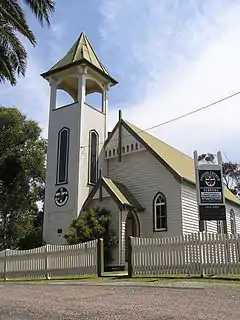
Some united congregations exist. The UCA has joined with other churches, such as the Baptist Union and the Churches of Christ, in some locations. There are also cooperative arrangements where supplying ministry to congregations is impossible, particularly in remote areas. This includes arrangements with the Anglican Church, where ministry and (sometimes) property resources are shared.
Faith communities are less structured than congregations. They are groups of people who gather together for worship, witness or service and choose to be recognised by the presbytery. Local churches are sometimes also used by congregations of other denominations; for example, a Tongan Seventh-day Adventist congregation may make arrangements to meet in the building on a Saturday. The UCA is committed to inclusivity, and there are a number of multicultural ministry (MCM) arrangements in which Korean, Tongan and other groups form congregations of the church.
Co-operating congregations
Co-operating congregations, typically in rural areas, have several denominations worshiping as one congregation and rotate the denomination appointing its next minister. They are known as union churches in some places, with several denominations using the building at different times.
Frontier Services
A Frontier Services ministry is available to residents of the outback, with ministers and pastors visiting families by air or four-wheel drive vehicles. Visits are normally arranged in advance so adjacent families can travel for significant events, such as baptisms. These "padres" are based in a major town or city, and the local synod is normally their organisational and funding body.
Uniting Aboriginal and Islander Christian Congress
The Uniting Aboriginal and Islander Christian Congress (UAICC, sometimes known simply as the Congress), is constitutionally recognised as having responsibility for oversight of church ministry to the Aboriginal and Torres Strait Islander people:
A Synod may at the request of a Regional Committee of the Uniting Aboriginal and Islander Christian Congress prescribe that the Regional Committee may have and exercise all or specific rights, powers, duties and responsibilities of a Presbytery under this Constitution and the Regulations (including ordination and other rights, powers and responsibilities relating to Ministers) for the purpose of fulfilling any responsibility of the Regional Committee for Uniting Church work with Aboriginal and Islander people within the bounds of the Synod.[22]
Agencies
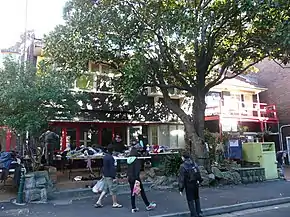
UnitingCare Australia, one of the country's largest providers of social care, is its largest operator of aged-care facilities. Other activities include shelters and emergency housing for men, women and children; family-relationships support; disability services, and food kitchens.
Education
The UCA provides theological training through a number of theological colleges:
- New South Wales: United Theological College, Parramatta a member of the School of Theology at Charles Sturt University.
- Queensland: Trinity College (with Australian Catholic University)
- South Australia: Uniting College for Leadership and Theology, Adelaide College of Divinity
- Victoria and Tasmania: Pilgrim Theological College, part of the University of Divinity
- Western Australia: Perth Theological Hall[23]
Training generally takes five years, and includes supervised practical experience.
Youth
The National Christian Youth Convention is a national UCA activity during school and university holidays, every two or three years in a different city. NCYC 2007, "Agents of Change", was held in Perth.[24] The 2009 "Converge" was held in Melbourne. NCYC 2011 was held from 29 December 2010 to 4 January 2011 at the Southport School on Queensland's Gold Coast. Yuróra NCYC 2014 was held in North Parramatta, Sydney from 7 to 10 January 2014.[25] Yuróra NCYC 2017, "Uniting Culture", was also held in Sydney in January 2017.[26]
International aid
UnitingWorld is the church's international-aid agency.[27] It receives funding from the government of Australia to implement development and poverty-alleviation programs in the Pacific, Asia and Africa.[28] UnitingWorld works in partnership with 18 overseas denominations to support over 180,000 people annually through sustainable community development projects.[27]
Ministry
The role of the laity is valued in the UCA, which recognises that ministry is a function of the entire church. However, "specified ministries" are defined.[22] Of these, the roles of elder and pastor are open to lay members. The church has two orders of ordained ministry: minister and deacon.
When it is not possible (or desirable) to have an ordained minister, a lay preacher or lay ministry team may act in their place (similar to a Methodist local preacher). Lay preachers are required to participate in training and examinations conducted by each synod, and must be approved by the presbytery.[14]
Culture
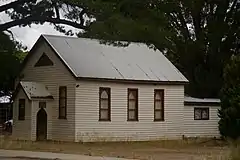
The UCA was one of the first Australian churches to grant self-determination to its indigenous members through the Uniting Aboriginal and Islander Christian Congress. Partnerships exist with South Pacific and Asian churches, especially those which share a Congregational, Presbyterian or Methodist heritage. An increasing number of ethnic churches worship in their own languages as well as in English. Five to seven per cent of the membership worship in languages other than English, including Aboriginal languages.[29]
The UCA advocates for social justice. It has taken stances on issues such as native title for indigenous people; the environment; apartheid; refugee status, and safe injection facilities for drug users. The church is similar to other united and uniting churches, which maintain a cultural identity in their own country and practise ecumenical fellowship with other Christian denominations worldwide.[30] Between 1991 and 2013, UCA attendance declined by 41 per cent. In 2013, about 97,200 people attended weekly worship services throughout Australia.[31]
Liturgy
The church is liturgically varied. Practices range from experimental liturgies, informal worship reminiscent of the Jesus movement to conventional Reformed services. Music also varies from traditional and contemporary hymns in the Australian Hymn Book and Together in Song, through Hillsong and contemporary Christian music to hard alternative and metal.
Liturgical dress in the UCA is generally lenient, and is optional for ministers and other leaders of worship.[32] When liturgical dress is worn, it most commonly consists of a white alb and a stole (for ministers and deacons) or scarf (for lay preachers). The colour of the scarf or stole is often related to the liturgical calendar, such as purple for Lent or red for Pentecost.
Decision-making
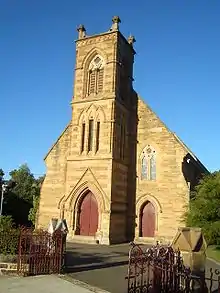
Since 1997, most councils and agencies have used the consensus decision-making procedures outlined in the church's Manual for Meetings. The procedures may use orange ("support") and blue ("do not support") cards, which may also be displayed times other than voting.
Theology
The UCA's theological range is broad, reflecting its Methodist, Presbyterian and Congregational origins and its commitment to ecumenism. Its theology may be described as mainline Protestantism, with a commitment to social justice. The church's perspectives are evangelical, left (or progressive), and liberal. Morality, faith, and (in particular) sexuality have been debated. Concerns focus on biblical understanding and accommodation to the broad culture.
Uniting Network Australia is "the national network for lesbian, gay, bisexual, intersex and transgender people, their families, friends and supporters within the Uniting Church in Australia."[33] The establishment of Evangelical Members within the Uniting Church in Australia (EMU), the Reforming Alliance and their merger with the Assembly of Confessing Congregations (ACC) illustrate conservative opposition to the ordination of gay and lesbian candidates and the influence of the Confessing Movement (not to be confused with the anti-Nazi Confessing Church).
Homosexuality
| Part of a series on |
| Christianity and LGBT topics |
|---|
|
|
Issues debated since early in UCA history are the role of gay and lesbian people in the church, their possibility of being ordained and the blessing of same-sex unions. The church permits local presbyteries to ordain gay and lesbian ministers,[34] and extends the local option to marriage; a minister may bless a same-sex marriage.
The fairly broad consensus has been that a person's sexual orientation should not be a bar to attendance, membership or participation in the church. More controversial has been the issue of sexual activity by gay and lesbian people and the sexual behaviour of ordination candidates. In 2003, the church voted to allow local presbyteries to decide whether to ordain gay and lesbian people as ministers.[35] Ministers were permitted to bless same-sex couples entering civil unions even before same-sex marriage was legalised in Australia in late 2017.[36] In July 2018, the national assembly approved the creation of marriage rites for same-sex couples.[37]
Since 1997, some ministers living in same-sex relationships have come out without their ordination (or ministry) being challenged. In 2011, the church approved the blessing of same-sex unions.[38] Seven years later it allowed local congregations and ministers to decide whether to perform same-sex marriages, and ministers may now do so.[39]
In March 2021, the UCA became the first mainstream Australian church to induct a transgender minister, when Jo Inkpin was installed at Pitt Street Uniting Church in Sydney.[40][41]
Theologians
Assemblies
| No. | Date | President | General secretary | Location |
|---|---|---|---|---|
| 1 | June 1977 | Davis McCaughey | Winston O'Reilly | Sydney |
| 2 | May 1979 | Winston O'Reilly | O’Reilly (until December 1979) | Melbourne |
| 3 | May 1982 | Rolland Busch | David Gill (from January 1980) | Adelaide |
| 4 | May 1985 | Ian B. Tanner | David Gill | Sydney |
| 5 | May 1988 | Ronald Wilson | David Gill (until July 1988) | Melbourne |
| 6 | July 1991 | D'Arcy Wood | Gregor Henderson (from January 1989) | Brisbane |
| 7 | July 1994 | Jill Tabart | Gregor Henderson | Sydney |
| 8 | July 1997 | John Mavor | Gregor Henderson | Perth |
| 9 | July 2000 | James Haire | Gregor Henderson | Adelaide |
| 10 | July 2003 | Dean Drayton | Terence Corkin (from January 2001) | Melbourne |
| 11 | July 2006 | Gregor Henderson | Terence Corkin | Brisbane |
| 12 | July 2009 | Alistair Macrae | Terence Corkin | Sydney |
| 13 | July 2012 | Andrew Dutney | Terence Corkin | Adelaide |
| 14 | July 2015 | Stuart McMillan | Colleen Geyer (from January 2016) | Perth |
| 15 | July 2018 | Deidre Palmer | Colleen Geyer | Box Hill, Victoria (Melbourne) |
| 16 | July 2021 | Sharon Hollis | Colleen Geyer | online |
See also
- Christian Conference of Asia
- Confessing Movement
- Congregational Federation of Australia
- Fellowship of Congregational Churches
- Homosexuality and Christianity
- Presbyterian Church of Australia
- Progressive Christianity
- Rupert Grove
- United and uniting churches
- United Church of Canada
- Wesleyan Methodist Church of Australia
- World Alliance of Reformed Churches
- World Methodist Council
References
- "Submission to the Review of the ACNC Legislation" (PDF). Uniting Church in Australia. February 2018.
- "UCA - Our History".
- "Uniting Church in Australia Assembly - About the Uniting Church in Australia". assembly.uca.org.au. Retrieved 19 November 2019.
- Krajevitch, A.; Blot, P.; Cara, M. (1975). "[Transport of newborn infants. Apropos of 114 cases]". Annales de l'Anesthésiologie Française. 16 Spec No 1: 135–142. ISSN 0003-4061. PMID 2071.
- 2016 Census of Population and General Community (Sheet G14) Australian Bureau of Statistics
- "Cultural Diversity in Australia". abs.gov.au. Australian Bureau of Statistics. 21 June 2012. Retrieved 14 May 2016.
- "Census vs Attendance (2001)" National Church Life Survey
- "Uniting Church in Australia Assembly". Retrieved 18 January 2020.
- "Dr Deidre Palmer: God's abundant grace shapes and reshapes us". Insights Magazine. 9 July 2018. Retrieved 9 July 2018.
- President-Elect announced, Uniting Church in Australia, 16 July 2015
- "President-Elect announced". Uniting Church in Australia. 16 July 2015. Retrieved 18 July 2015.
- "Sharon Hollis named as UCA President-elect". Uniting Church in Australia. 12 July 2018. Retrieved 12 July 2018.
- Pulford, Matt (15 July 2021). "Is the UCA ready for a President of colour?". Eternity News. Retrieved 16 July 2021.
- "The Uniting Church in Australia Regulations" (PDF). pp. 75–78. Retrieved 7 November 2016.
- "Uniting Church in Australia Assembly - Home". uca.org.au.
- "Uniting for the common good". Synod of NSW and the ACT.
- "The Uniting Church in Australia Queensland Synod".
- "Uniting Church SA - Uniting Church. Uniting People".
- "Uniting Church in Australia, Western Australia".
- "Uniting Church in Australia. Synod of Victoria and Tasmania".
- "Uniting Church in Australia Northern Synod".
- "Constitution of the Uniting Church in Australia (2004)" Uniting Church Assembly Website
- Commission for Education for Discipleship and Leadership, Annual Report 2018
- "NCYC 2007: Agents of Change". Retrieved 9 January 2007.
- "NCYC 2014". Archived from the original on 26 February 2015.
- "Yurora 2017". National Christian Youth Convention. Archived from the original on 5 February 2017.
- "UnitingWorld Annual Report 2018" (PDF). UnitingWorld Governance and Structure.
- "List of Australian accredited non-government organisations (NGOs)". Department of Foreign Affairs and Trade. Retrieved 19 July 2019.
- "Wesley Mission - The Uniting Church". www.wesleymission.org.au. Retrieved 19 July 2019.
- Helen Richmond; Myong Duk Yang, eds. (2006). Crossing borders : shaping faith, ministry and identity in multicultural Australia. Sydney: Openbook Australia. pp. 138–146. ISBN 1864072474. OCLC 224450283.
- "2013 Uniting Church Census of congregations and ministers - Headline Report" (PDF). National Church Life Survey Research. p. 4. Archived from the original (PDF) on 11 April 2021. Retrieved 9 February 2016.
- Gribben, Robert. "Liturgical Dress in the Uniting Church" (PDF).
- "Uniting Network Australia". Retrieved 18 November 2018.
- "Global Trend: World's oldest Protestant churches now ordain gays and lesbians". ucc.org. United Church of Christ. Archived from the original on 10 July 2017. Retrieved 21 April 2016.
- O'brien, Kerry. "Nile quits church over gay ordination decision". abc.net.au. ABC. Retrieved 21 April 2016.
- Hiatt, Bethany. "Uniting Church may overhaul rules of marriage". au.news.yahoo.com. AU News. Archived from the original on 1 April 2016. Retrieved 21 April 2016.
- Sandeman, John (13 July 2018). "Uniting Church to hold same sex marriages". Eternity. Australia. Retrieved 13 July 2018.
- UnitingNetworkAustralia Archived 2011-02-18 at the Wayback Machine
- "Uniting Church to allow same-sex marriages". SBS News. Retrieved 13 July 2018.
- "Joesphine Inkpin to serve as new minister at Pitt Street Uniting Church". Insights Magazine. Retrieved 9 July 2021.
- "'Tears of joy' as trans priest becomes Uniting Church minister". ABC News. 30 March 2021. Retrieved 9 July 2021.
